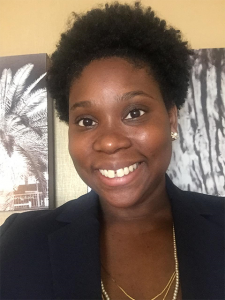
Dr. Rashidah H. Farid is a recent WEC PhD graduate and president of UF Natural Resources Diversity Initiative (NRDI).
What is your research on?
My dissertation explores the intersection of sociality and its impact on demography in Gunnison’s prairie dogs, understanding how the environment impacts their population dynamics.
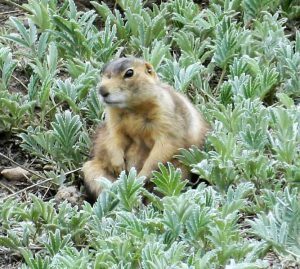
What’s it like working with prairie dogs?
It’s awesome! They’re really cute. I got the chance to do two summers of fieldwork and to study their behavior intimately in New Mexico in a park called Valles Caldera. It’s a beautiful area of open prairies and mountains.
Working with prairie dogs has its downside too. They are a keystone species, but they are awfully, heavily affected by bubonic plague.
My study population actually died from the plague, so I have a bittersweet relationship with Gunnison’s prairie dogs.
That’s terrible!
Yeah, 100% mortality.
Aside from the fact that they all died, are prairie dogs your favorite animal that you’ve worked with?
I don’t think so! I’ve been a general ecologist for most of my life. I thought when I focused on one species for my PhD that would change, but I surely do not have a favorite animal. I’ve done Dahl’s sheep surveys in Alaska, I’ve worked with hellbenders in Missouri, and I’ve worked with prairie dogs and bats, so I really do not have a favorite. I have a cat named Misha, she’s my favorite!

It’s not limited to animals either—I worked with plants for my masters. I just enjoy all things that are considered to be a part of natural resources. I still enjoy policy work when it comes to freshwater and water pollution, or anything related to air and soil contamination. I enjoy all of those things as well, so I’m not necessarily a traditional wildlife person!
I just really love all of ecology and conservation in general.
Have you done anything with policy before?
Before I was a graduate student, I was a contractor for the Department of Defense at Fort Polk, in Louisiana. Fort Polk is a Joint Readiness Training Center. I did quite a bit of soil work there, as well as developing plans for a lot of sediment-basins , building new roads, etc.
That involves quite a bit of policy work. There’s paperwork in terms of going out and doing environmental assessments, as well as knowing actual laws and policies that govern water, point source pollution, and boundaries related to natural resources. We had a population of endangered red cockaded woodpeckers, so we had to go out and assess whether there would be impacts to those species based upon where we built a road, or wanted to cut timber.
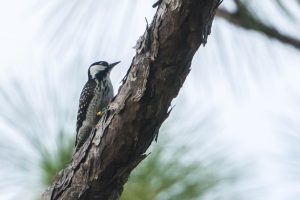
I did a lot of policy work that way. Most recently, I applied for a fellowship called the Environmental Grantmakers Association Environmental Fellowship Program.
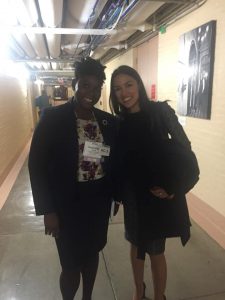
It’s through the University of Michigan’s Sustainability and Policy department. Last summer I spent a lot of time working with nonprofits, with grassroots organizations and social justice projects, as well as natural resource protection groups. So as part of that, I got a chance to stick my toe into a little bit of policy and regulation. As a follow up to that fellowship, I was selected by the Environmental Grantmaker’s Association, again, to be a part of the environmental policy briefing in Washington, DC. So this is a great chance for me to meet with
congressional representatives and talk about the Green New Deal, and to be briefed on the upcoming policies. It’ll be a lot of prep work, but it’ll be fun. I get a chance to go to DC and talk to congresspeople about what the upcoming policies will be that will govern how we function in the US in natural resource protection.
How did you become interested in ecology? Do you have an origin story?
Oooh, yes. I am from rural, backwoods, Abbeville, Alabama. It is a town of 2,600 people. I grew up the youngest of seven, and I spent most of my childhood in my backyard. I was very lucky. My backyard was five acres of hardwood forest with little creeks and streams. I spent all of my childhood in the woods, the forest, with nature. I knew nothing but agriculture and natural resources my entire childhood, and I’ve never actually branched from that. I’m a big aggie. My background is in agriculture (animal science) and I adore natural resources. I always have, from at least the age of three. Before I was in elementary school!
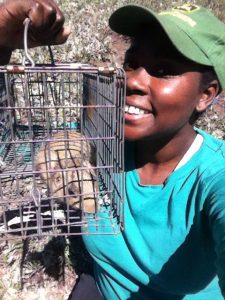
That’s the main response I get to this question. It seems that people have always known and always been interested in this subject since they were little kids.
Yeah, and I was a pretty creepy kid. By the time I was ten, I became interested in reproduction and completely obsessed about it. I read everything there was to know about reproduction. There was an old set of encyclopedias in our library. It was from the ‘70s, and the books still had the gold leaf on top, you know, old fashioned encyclopedias. I was interested in everything that had to do with reproduction: mating, social behavior, everything. I had cats at home, and a little handbook, and when it was mating season and the cats would go into estrous I would write it down, and I would look in the encyclopedia for how long it would take for them to birth kittens, and the signs of birthing, parturition (I didn’t know that was what it’s called at the time).
When it was time I would take old clothes and put them in the drawers beneath my bed, and I would place the cat inside the drawer every night of the week before I thought she was going to give birth, then I would slowly pull out the drawer , then watch the whole birthing process.
I was a very weird child. I’ve been obsessed with reproduction for a very long time. I never imagined I’d be a demographer, but apparently I was just destined to be one because all I care about is reproduction.
It was pretty freaky. I was not a normal 10 year old.
Do you have any crazy stories from the field?
I’ve almost died so many times, there are a lot of crazy stories!
There was the one time I was working for the Fish and Wildlife Service in my first internship as an undergrad, at Back Bay National Wildlife Refuge in Virginia Beach, Virginia.
I was doing sea turtle cruises—riding little ATV’s along the beach before sunrise and looking for tracks from sea turtles that came up to nest. Apparently, my battery was low, and then it died! This was before 5 AM, so even the refuge ranger/police officer wasn’t there yet. He doesn’t get in until around 6:30. So here I am, on the beach, and of course I’m the only minority for miles around. I’m only 18 or 19 years old, and it’s dark. This was a very wealthy community, there were 2.5 million dollar houses all around me. I radioed to base station, but no one was there yet, so I was like, “What do I do?”
Then this guy comes out of one of the houses with a flashlight, and he says, “Ma’am, can I help you?”
I said, “Yes sir, I’m an intern with USFWS, and I’m surveying for sea turtles, my vehicle died, and no one is awake yet.”
I explained this whole thing. It’s still dark, it’s like no later than 5:30 in the morning, and he’s like,
“Well, come on in! We’re getting ready for breakfast!”
I thought, What? This is so weird.
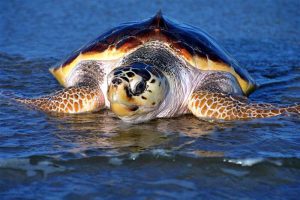
So this random man invited me into his house, it’s dark outside, and I’m just hoping he has a family, otherwise I’m about to be ax-murdered. He let us into his house, and all the lights are on and the kids are up. He did have a family, his whole family was vacationing, including his cousins and some other random children, and they asked, “Would you like some breakfast?!”
So I said sure, just to be polite, waiting for the ranger to get to work, and they had baloney sandwiches on white bread. For breakfast! It was the weirdest thing. I felt like I was in the Twilight Zone. This is how people are killed or kidnapped. I was certain this would be the end of my life. But they were perfectly nice, and even when the ranger got there, they actually looked up the ranger’s home phone number and called him, so he came to work early to fetch me.
When I worked in Alaska, we were putting out sediment basins for a road capacity study. We put out these buckets of water that collect soil or dust from the road as vehicles drove by.
We were putting out these dust collection buckets, and we were walking uphill through a conifer forest, which was very steep. You couldn’t see much in front of you because it was all forested. We were spaced out close enough that we could talk to each other, but not that we could see each other. I heard something in the bushes, and when I got ready to put out the next bucket I asked the other people if they knew what was going on. They were all laughing at me, like, “Oh, you’re from the lower forty eight, you’re just afraid of bears,” making fun of me because they thought it was my imagination.
Then, out of nowhere, this animal walked, maybe, ten feet in front of me. It just walked past, and then I saw a second animal. I just turned around and ran down the hill, yelling that I’d seen a bear. We got to the base of the hill, and looked up, and it wasn’t a bear. It was a lynx! One of the rarest animals you can see on the planet, and I just walked up on one! It just slowly walked away.
That was pretty freaky!
I almost died when I was working for the Department of Defense. We were sampling for freshwater turtles inside a creek. We had set up the turtle traps a day before, and went back out to the creek to check them. We had permission to be there, so we went in and were going about our work when all the sudden bullets started whizzing past us, flying left and right!
We were in waist-deep water, but we crouched down to our chins and started crawling on our knees to avoid the bullets. We got to the edge of the creek, and we radioed in to range control, and they shut all operations down on the base, which takes a lot of paperwork. Basically, there was a unit that was bored, decided to go rogue, and started shooting. And they almost killed us!
That’s insane!
Yeah. So yeah, I almost died several times! But I’ve had a lot of fun.
It seems like you do so many different things. How do you manage your time?
I have a calendar, a personal planner, and a smart phone. If it’s not in the planner, then it doesn’t exist. That’s how I keep track of everything.
What difficulties have you faced as an African American woman in natural resources?
Well, there are different layers, right?
So the first layer, being an African American female, or a woman in general, is that wildlife and natural resources are traditionally white male-dominated fields, so males have a tendency to want you to prove yourself and do things the way they do them. In terms of physicality, I spent many of my years when I was 19 to about 25 trying to prove myself physically. You have to do things in the same way that a white male would do them. Of course, that’s complete nonsense, and I know that now, but when I was younger I really felt like I had to do things the way they did them, and that I had to physically be able to do the exact same things that they could do. That’s wonderful if that’s what you want to do, but I think the idea in itself was really a barrier to me being the whole person that I am. I’m not a white male, and truth be told there are many males who are stronger than me, just like there are many females who are stronger than me. It was absolutely nonsense for me to put myself in circumstances that were potentially unsafe physically, just because I was trying to prove myself to have a right to be in the field of wildlife. And then, being African American, you just have to accept that you’re always going to be one, or one of two. When I worked in Fish and Wildlife, I was the only African American. When I worked in the Missouri Department of Conservation, there were other individuals that were administrative, but I was the only African American doing fieldwork. In Alaska, I was the only African American on the behind the scenes, research-based team.
So I’m always the only African American, or one of two or three, so that is always a factor. You learn from a very early age to be very comfortable in your skin, and in who you are as a person, because without that, the world will impose upon you who they think you should be. So for a lot of people, I feel like that’s what happens. They go out into the world and become lost or confused or they’re not as confident, because they don’t have a good sense of self-identity, and that’s the most important thing for any young person. Really for any field or career that you’re interested in, you need to make sure that before you go out into the world that you know who you are, personally. It grounds you. So you become very comfortable in uncomfortable situations. To be uncomfortable is normal for me.
If you could go back to when you were in undergrad and give yourself advice, what would you say?
No fear!
I seem kind of fearless, but it’s amazing how many opportunities I shied away from because I was afraid, or I thought I wasn’t talented enough, or I thought I would be the only one that looks like me, and that that would be an uncomfortable situation.
So: conquer all fear. There is no such thing as fear if you want to be successful in life.
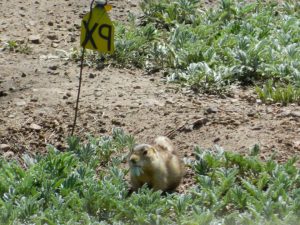
This interview is by Rhett Barker, and has been edited for clarity by Claire Williams and Rhett Barker.
Thanks to Dr. Farid for speaking with us!
Click here learn more about the UF/IFAS Department of Wildlife Ecology and Conservation!
 0
0
